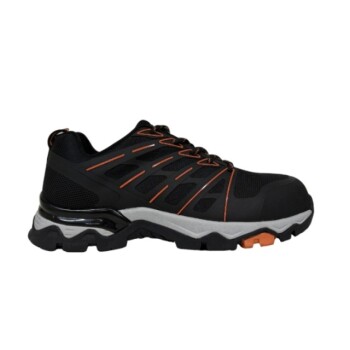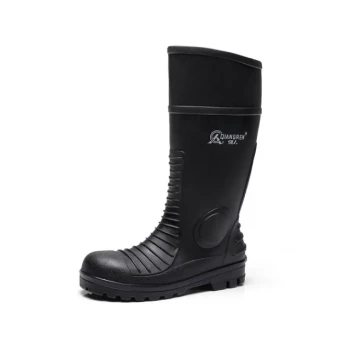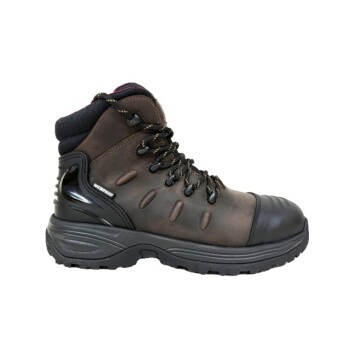At their core, steel toe shoes are defined by a reinforced steel cap integrated into the toe box. This single component provides exceptional protection against both direct impacts from falling objects and compression from heavy rolling equipment. While this protective cap is their most famous feature, they are part of a broader category of safety footwear that includes other critical elements like slip-resistant outsoles and durable construction.
The essential takeaway is that a steel toe is not just a feature, but a foundational choice. It prioritizes maximum impact and compression resistance, often at the cost of increased weight, making it the classic standard for heavy-duty industrial environments.
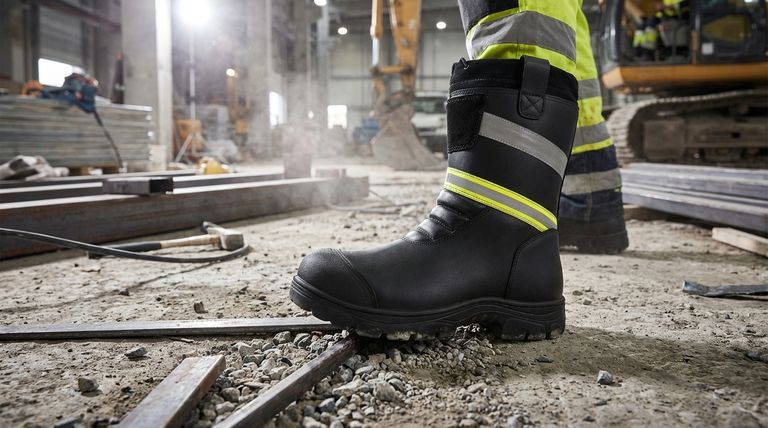
The Anatomy of Protection
A steel toe shoe is a system where each part contributes to overall safety and performance. Understanding these components helps clarify what you are getting beyond just the reinforced toe.
The Protective Toe Cap
The defining feature is the steel toe cap. It is engineered to withstand significant force, protecting the wearer's toes from severe injuries in hazardous workplaces.
This component is the primary reason these shoes are mandated in fields like construction, manufacturing, and logistics.
The Foundation: Outsole and Midsole
The outsole is the part that contacts the ground. In safety shoes, it is almost always designed to be slip-resistant, providing crucial traction on wet or oily surfaces.
The midsole provides cushioning and support. In some models, a puncture-resistant plate is embedded here to protect the foot from sharp objects like nails.
The Structure: Upper, Lining, and Insole
The upper refers to the main body of the shoe. It is typically made from durable materials like leather to withstand abrasion and wear.
The inner lining and insole are designed for comfort and moisture management during long hours of work. Some linings offer features like thermal insulation or enhanced breathability.
Core Protective Benefits
While the steel cap is central, these shoes offer a suite of protections that address common workplace dangers.
Impact and Compression Resistance
This is the most critical benefit. The steel cap is rated to protect against specific levels of force, preventing crushing injuries from heavy machinery or falling materials.
Slip and Puncture Resistance
A high-traction outsole is a standard feature that reduces the risk of falls. When paired with a protective midsole plate, the shoe also guards against penetration from below.
Electrical Hazard Protection
Many steel toe shoes are rated for Electrical Hazard (EH) protection. When properly constructed and insulated, they can prevent the wearer's body from completing an electrical circuit, offering a defense against shock.
Understanding the Trade-offs
Choosing a steel toe shoe involves weighing its primary benefits against its inherent characteristics. No safety shoe is perfect for every situation.
Weight vs. Durability
Steel is heavy. This is the most noticeable drawback of steel toe shoes compared to alternatives like composite toes. The added weight can lead to fatigue over a long shift.
However, that weight comes with exceptional durability. Steel caps can often withstand higher impacts than their composite counterparts.
Cost vs. Advanced Features
Steel toe shoes are typically less expensive than composite toe models. This affordability makes them a highly accessible and popular choice for complying with safety standards.
The trade-off is that other modern features, such as being metal-free for security checkpoints or having electrostatic discharge (ESD) properties, are found more commonly in composite or alloy toe footwear.
Making the Right Choice for Your Goal
Selecting the correct safety footwear depends entirely on the hazards present in your specific environment.
- If your primary focus is maximum impact resistance: A steel toe shoe is the proven, cost-effective standard for environments with heavy machinery, falling tools, or rolling equipment.
- If your primary focus is working around live circuits: You must select a steel toe shoe that is explicitly rated for Electrical Hazard (EH) protection.
- If your primary focus is all-day comfort and reduced fatigue: You may want to consider a composite toe shoe, but be prepared for a higher cost and potentially lower impact resistance.
Ultimately, understanding the specific dangers of your job is the key to selecting footwear that truly protects you.
Summary Table:
| Key Feature | Primary Benefit | Ideal For |
|---|---|---|
| Steel Toe Cap | Maximum impact & compression resistance | Construction, manufacturing, logistics |
| Slip-Resistant Outsole | Prevents falls on wet/oily surfaces | Warehouses, kitchens, industrial floors |
| Electrical Hazard (EH) Rating | Protection against electrical shock | Electrical work, utility sectors |
| Durable Upper (e.g., Leather) | Long-lasting wear & abrasion resistance | Heavy-duty environments |
| Puncture-Resistant Midsole | Guards against sharp objects (e.g., nails) | Demolition, roofing, scrap handling |
Need Reliable Steel Toe Shoes for Your Team?
As a large-scale manufacturer, 3515 produces a comprehensive range of safety footwear for distributors, brand owners, and bulk clients. Our production capabilities encompass all types of industrial shoes and boots, including steel toe models designed for maximum durability, comfort, and compliance.
We help you equip your workforce with high-quality, cost-effective safety solutions tailored to your specific hazards.
Contact us today for bulk pricing, customization options, and samples!
Visual Guide
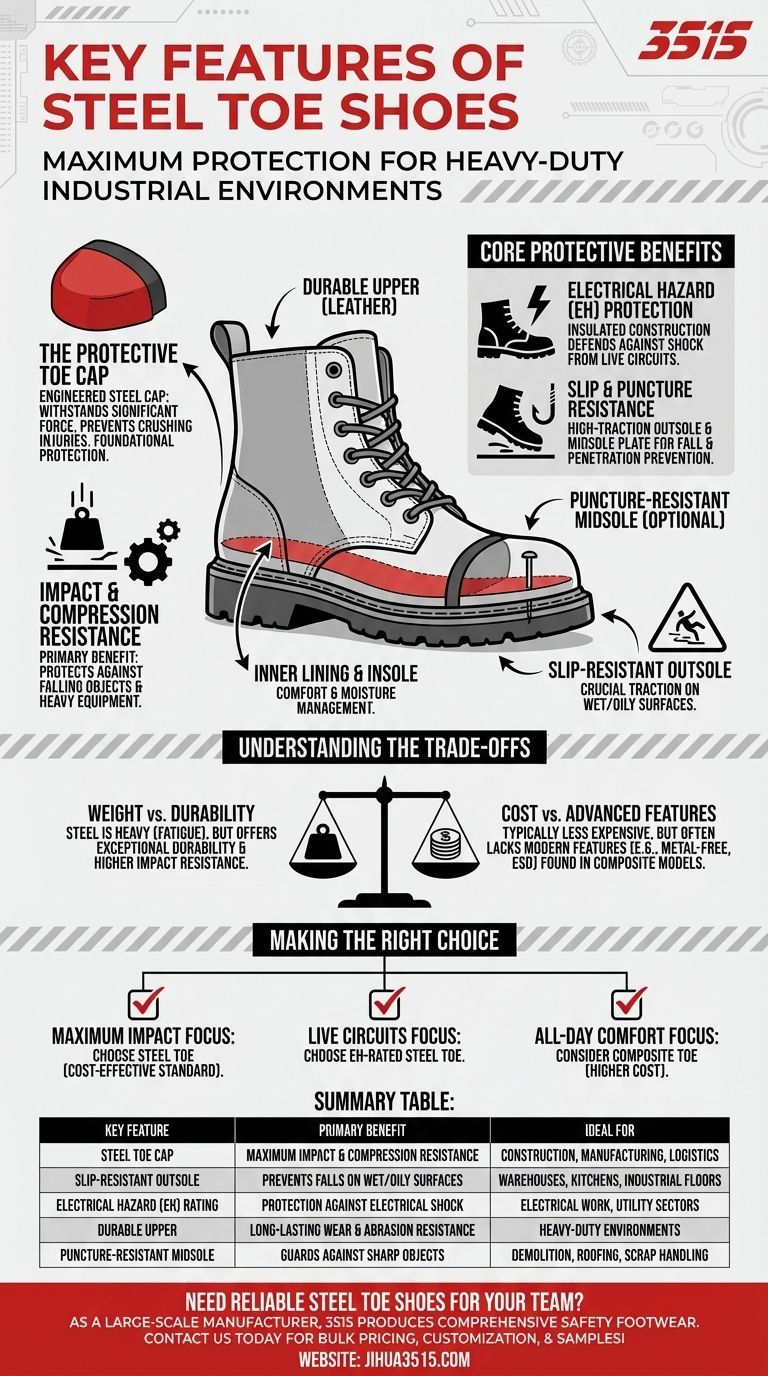
Related Products
- High Performance Fire-Retardant Waterproof Safety Boots
- Premium Wholesale Waterproof Safety Boots High Performance Protection for Industrial Markets
- Premium High-Cut Waterproof Safety Boots Manufacturing & Wholesale Solutions
- Premium KPU Injection Athletic Style Safety Shoes
- Premium Grain Leather Safety Boots for Bulk Supply
People Also Ask
- Why are steel toe boots typically less comfortable than casual footwear? The Protection vs. Comfort Trade-off
- What are the different types of materials used in the toe portion of safety toe work boots? A Guide to Steel, Alloy & Composite
- What safety standards do modern steel toe boots adhere to? Understanding ASTM & EN ISO for Maximum Protection
- How do steel toe shoes protect workers? The Ultimate Guide to Foot Safety
- What weatherproofing features are available in steel toe boots? Stay Dry & Safe in Any Condition
- What are the differences between soft toe, composite toe, and steel toe boots? A Guide to Maximum Safety & Comfort
- How does a reinforced safe toe tip contribute to footwear? Enhancing Safety and Structural Durability
- Why choose steel toe boots over composite? For Maximum Impact Protection & Durability



